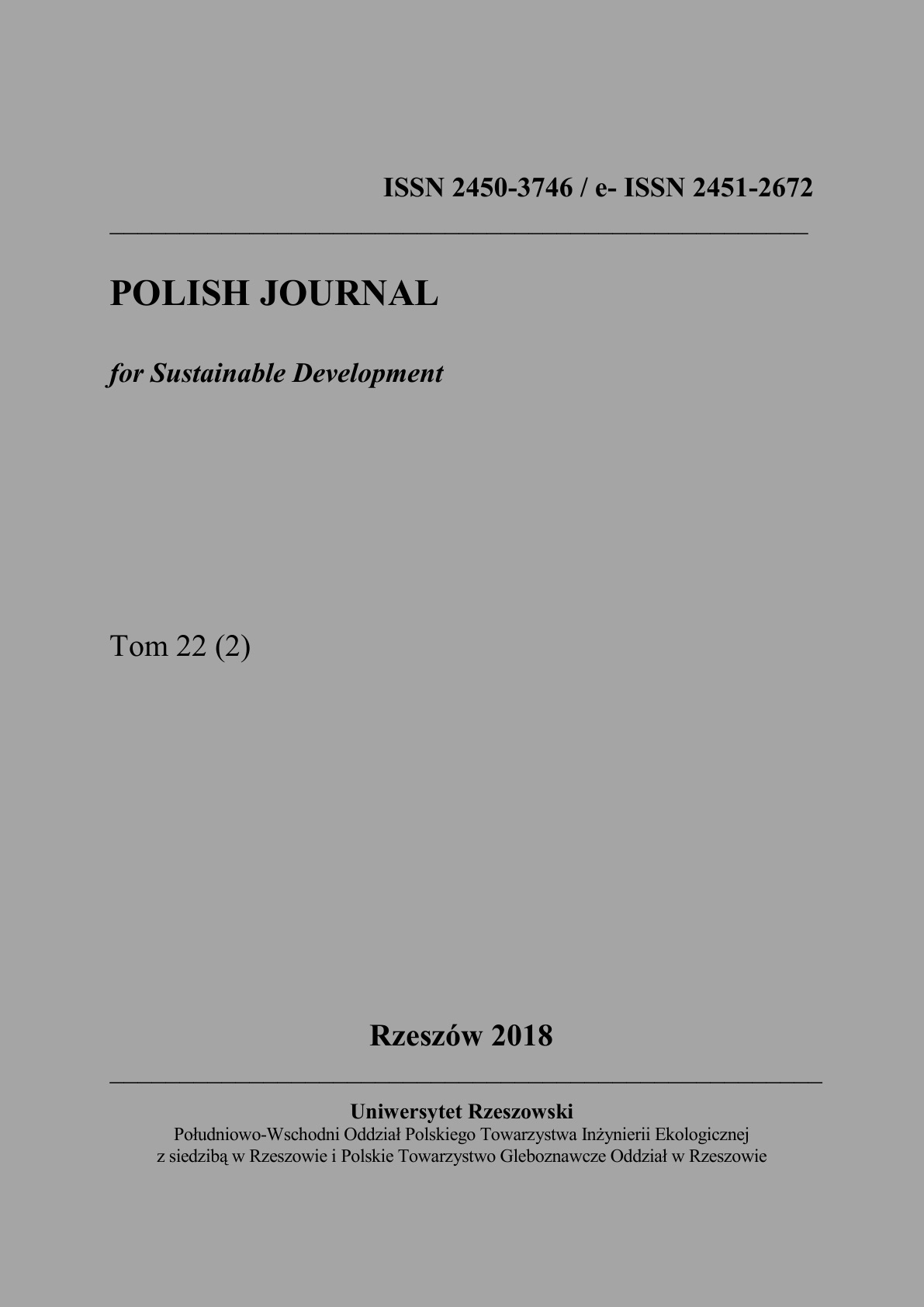Preliminary studies on vermicomposting of wastes of topinambur (Helianthus tuberosus L.)
DOI:
https://doi.org/10.15584/pjsd.2018.22.2.2Keywords:
earthworms, Dendrobaena veneta Rosa 1893, Jerusalem artichoke, vermiculture, vermicompostingAbstract
An interest in renewable energy sources is increasing. This is mainly for environmental reasons, anxiety about exhaustion of fossil fuel resources, as well as Polish and EU legal conditions. An example of plant grown for biomass is Jerusalem artichoke (Helianthus tuberosus L.), commonly known as topinambur. Apart from its energetic values, it has a wide range of other applications, on using which, some organic waste may appear in the environment. The objective of the work was to determine the selected properties of vermicomposting process of topinambur. Topinambur residues, as well as topinambur residues mixed with cattle manure were vermicomposted together with the participation of Dendrobaena veneta earthworms. The characteristics of the obtained vermicomposts were determined.
Downloads
References
Anonim 2018. [dok. elektr. http://projekty.gdos.gov.pl/kdpo-lista-pozostalych-roslin-nalezacych-do-inwazyjnych-gatunkow-obcych. data wejścia 18.11.2018].
Blicharz-Kania A., Andrejko D., Śląska-Grzywna B. 2015. Przemysłowe zagospodarowanie topinamburu (Helianthus tuberosus L.). Logistyka. 5. 57-62.
Bzdęga K., Nowak T., Tokarska-Guzik A. 2009. Gatunki z rodzaju słonecznik (Helianthus sp). W: Inwazyjne gatunki roślin ekosystemów mokradłowych Polski. Pawlarczyk P., Dajdok Z. (red.). ss. 167.
Denisow B., Jachuła J., Rydzewski H., Tymoszuk K, Zdulski J. 2017. Słonecznik bulwiasty jako roślina użytkowa. Poszerzamy Horyzonty. Wyd. Mateusz Weiland Network Solutions. 85-97.
Dominguez J., Edwards C.A. 2004. Vermicomposting organic wastes: A review. In: Soil Zoology for Sustain Development in the 21st Century. S.H. Shakir Hanna and W.Z.A. Mikhall (eds). Cairo. 369-395. Dubas.
Dominguez J., Edwards C.A. 2011. Biology and ecology of earthworm species used for vermicomposting. In: Edwards CA, Arancon NQ, Sherman R. (eds.) Vermiculture technology. CRC Press. Taylor & Francis Group. Baton Raton. 27-40.
Garczyńska M. Pączka G., Wirkus K., Podolak A., Mazur-Pączka A., Bartkowska I., Kostecka J. 2018. Vermicomposting of post – harvest maize waste. Annual Set of Environment Protection. 20. 358-374.
Generalna Dyrekcja Ochrony Środowiska 2016. [dok. Elektr. http://projekty.gdos.gov.pl/kdpo-slonecznik-bulwiasty. dostęp: 22.11.2018].
Grzybek A. 2008. Zapotrzebowanie na biomasę i strategie energetycznego jej wykorzystania. Studia i Raporty IUNG-PIB. 11.11-23.
Horochowska M., Kołeczek E., Zdrojewicz Z., Jagiełło J., Pawlus K. 2017. Topinmbur – właściwości odżywcze i lecznicze słonecznika bulwiastego (Helianthus tuberosus L.). Pediatr Endocrinol Diabetes Metab. 30-36.
Jasiulewicz M. 2008. Wykorzystanie upraw energetycznych w strategii konkurencyjności regionów. Stowarzyszenie Ekonomistów Rolnictwa i Agrobiznesu Roczniki Naukowe. 10 (2). 98-102.
Kończak-Konarkowska B. 2009. Podstawy zaleceń nawozowych w ogrodnictwie, Podręcznik dla pracowni ogrodniczych stacji chemiczno-rolniczych. KSCHM w Warszawie, OSCHR w Gorzowie Wielkopolskim. ss. 69.
Kostecka J. 2000. Badania nad wermikompostowaniem odpadów organicznych, Zesz. Nauk. AR w Krakowie. Rozprawy. ss. 88.
Kostecka J., Garczyńska M., Pączka G. 2018. Food waste in the organic recycling system and sustainable development. Problemy Ekorozwoju. 13(2). 157-164.
Kostecka J., Pączka G., Garczyńska M., Podolak-Machowska A., Dunin-Mugler C., Szura R. 2014. Wykorzystanie wermikompostowania do zagospodarowania odpadów organicznych w gospodarstwach domowych. Inżynieria i Ochrona Środowiska. 17. 21-30.
Loh T.C., Lee Y.C., Liang J.B., Tan D. 2005. Vermicomposting of cattle and goat manures by Eisenia foetida and their growth and reproduction performance. Bioresource Technology. 96. 111-114.
Mohan S.M. 2014. Biodegradation of garden waste, market waste using Eisenia fetida and Eudrilus Eugenie and assessment of manure quality on tomato. Journal of Insttitution of Engineers (India) Series A. 95(2). 75-82.
Pączka G., Garczyńska M., Mazur-Pączka A., Podolak A., Szura R., Skoczko I., Kostecka J. 2018. Vermicomposting of sugar beet pulp using Eisenia fetida (Sav.) earthworms. Annual Set The Environment Protection. 20. 588-601.
Piskier T. 2009. Potencjał energetyczny topinamburu. Problemy Inżynierii Rolniczej. 1. 133-136.
Rożen A. 2001. Rozmnażanie się dżdżownic. Zeszyty Naukowe AR w Krakowie. Sesja Naukowa. 75. 101-106.
Selden P., DuPonte M., Sipes B., Dinges K., Vasudevan P. 2005. Small-scale vermicomposting. Cooperative Extension Service. Home Garden. 45. 1-4.
Sharma K., Garg V.K. 2018. Comparative analysis of vermicompost quality produced from rice straw and paper waste employing earthworm Eisenia fetida (Sav.). Bioresource Technology. 250. 708-715.
Suthar S. 2010. Pilot-scale vermireactors for sewage sludge stabilization and metal remediation process: Comparison with small-scale vermireactors. Ecological Engineering. 36. 703-712.
Ustawa o odpadach z dnia 27 kwietnia 2001r (Dz. U. z 2001 r. nr 62, poz. 628).
Downloads
Published
Issue
Section
License
Copyright (c) 2018 Polish Journal for Sustainable Development

This work is licensed under a Creative Commons Attribution-NonCommercial-NoDerivatives 4.0 International License.


